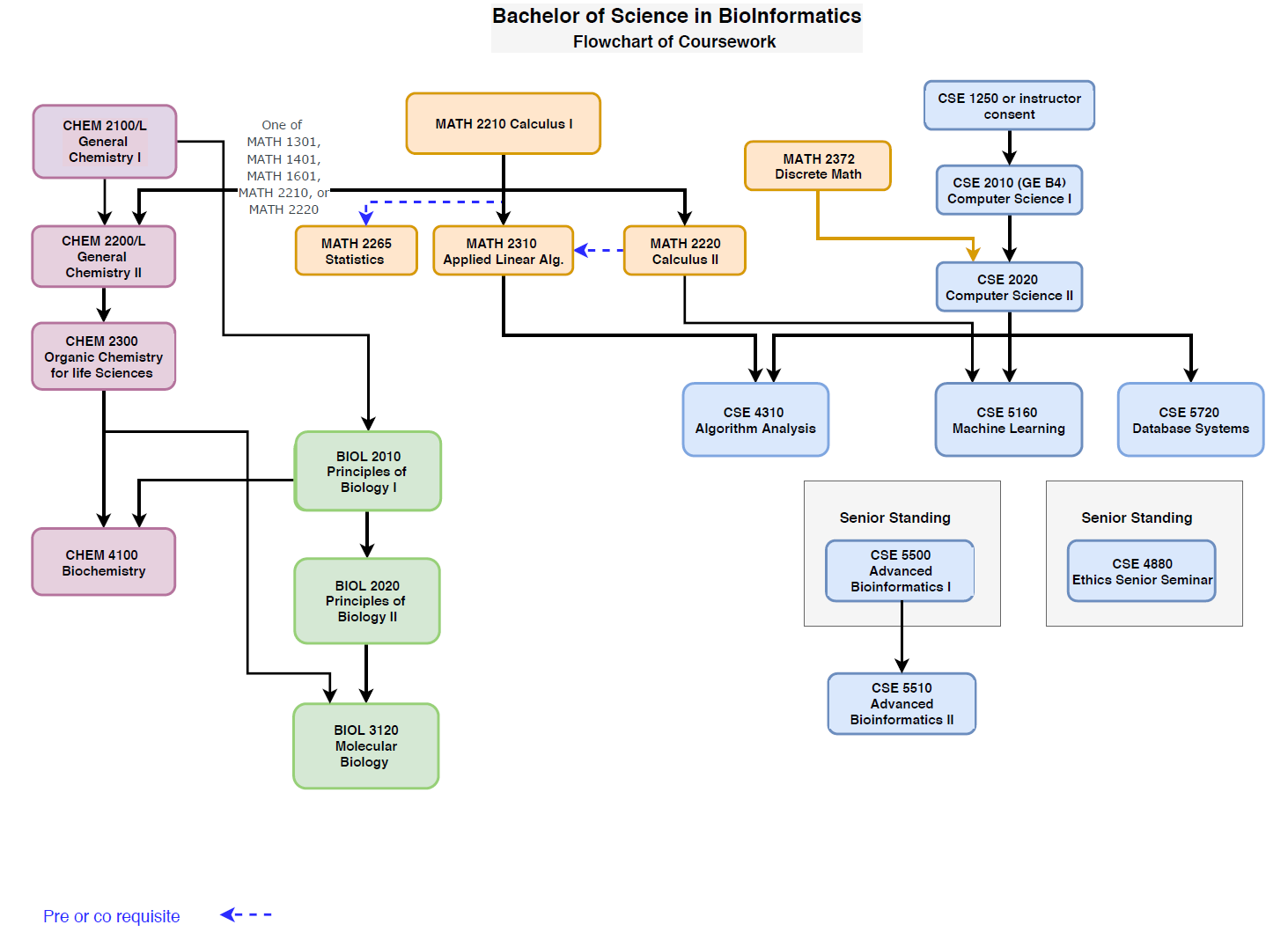Bioinformatics is the interdisciplinary study of biology and biochemical systems using mathematics and computer science. It involves the use of computers and statistics to make sense out of large amounts of data that are accumulating from high-throughput biological and chemical experiments, such as sequencing of whole gnomes, DNA microarray chips, two-hybrid experiments, and tandem mass spectrometry. The bioinformatics degree program is jointly administered by the School of Computer Science and Engineering, the Department of Biology and the Department of Chemistry and Biochemistry.
Program Information
Notice: MATH 2720 has been changed to MATH 2372
Program Educational Objectives and Student Outcomes
Program Educational Objectives
The graduates of the Bioinformatics program will have the following characteristics 3 to 5 years after graduation:
- Establish a successful career utilizing their education in bioinformatics or engage in advanced studies.
- Communicate effectively in both written and oral forms.
- Engage in lifelong learning to stay current with their profession as it changes.
- Demonstrate professional competence, integrity and responsibility in diverse work environments.
Student Outcomes
By the time of graduation, student outcomes should include the following:
- An ability to identify, formulate, and solve complex engineering problems by applying principles of engineering, science, and mathematics
- An ability to apply engineering design to produce solutions that meet specified needs with consideration of public health, safety, and welfare, as well as global, cultural, social, environmental, and economic factors
- An ability to communicate effectively with a range of audiences
- An ability to recognize ethical and professional responsibilities in engineering situations and make informed judgments, which must consider the impact of engineering solutions in global, economic, environmental, and societal contexts
- An ability to function effectively on a team whose members together provide leadership, create a collaborative and inclusive environment, establish goals, plan tasks, and meet objectives
- An ability to develop and conduct appropriate experimentation, analyze and interpret data, and use engineering judgment to draw conclusions
- An ability to acquire and apply new knowledge as needed, using appropriate learning strategies.
4-Year Sequence Roadmaps
Program requirements change from year to year. Students need to complete course requirements according to the academic year they last declared their major. This information is included on the PAWS Report.
Additional Resources
- Courses
- CSUSB Catalogs of Previous Years
- Transfer Students
- Forms and Templates
- Past Events
Career Advising
Students meet with a faculty adviser at least once per year for the purpose of reviewing progress towards the degree and to ensure that the student’s course choices allow the student to complete their degree program in a timely manner. And also to provide career advising to ensure the students are career ready.
Mission Statement
The main goal of the bioinfrmatics degree is to prepare students for graduate studies in bioinformatics. A secondary goal is to provide students with relevant skills that will be useful for research and development in the growing biotechnology industries.
| Year | Enrollment* | Graduations** |
|---|---|---|
| AY 2024/2025 | 6 | N/A |
| AY 2023/2024 | 8 | 4 |
| AY 2022/2023 | 7 | 0 |
| AY 2021/2022 | 12 | 2 |
| AY 2020/2021 | 10 | 2 |
| AY 2019/2020 | 6 | 2 |
| AY 2018/2019 | 8 | 2 |
| AY 2017/2018 | 9 | 1 |
| AY 2016/2017 | 12 | 2 |
| AY 2015/2016 | 9 | 0 |
| AY 2014/2015 | 12 | 2 |
| AY 2013/2014 | 9 | 2 |
| AY 2012/2013 | 9 | 1 |
| AY 2011/2012 | 9 | 1 |
| AY 2010/2011 | 7 | 1 |
| AY 2009/2010 | 7 | - |
| AY 2008/2009 | 4 | - |
* Declared bioinformatics majors in Fall semester of designated year.
** Annual graduations starting from Fall semester of designated year.
Source: CSUSB Office of Institutional Research
